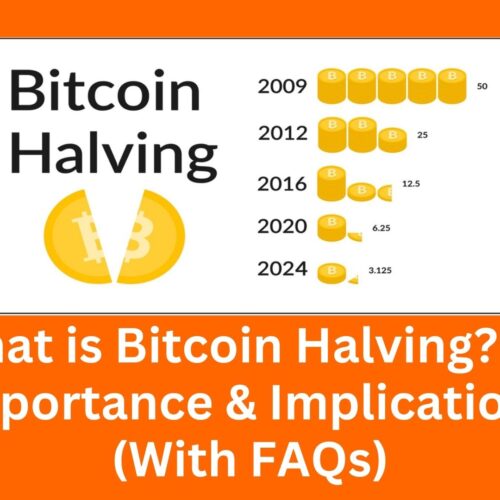Table of Contents
- What is Ethereum
- What is Ethereum in Simple Terms?
- Is Ethereum a cryptocurrency?
- What is the use of the Ethereum blockchain?
- Frequently Asked Questions (FAQs):
What is Ethereum
Ethereum is regularly cited as one of the most popular decentralized cryptocurrencies alongside Bitcoin. In 2012, at the age of 17, Vitalik Buterin was introduced to Bitcoin by his father and became very interested in the technology. Vitalik started writing for Bitcoin Magazine, proposing improvements for the Bitcoin platform. When these improvements didn’t happen, he decided to create his own cryptocurrency instead.
His idea was his Ethereum, which was published in 2015. Since its launch, the price of Ethereum has skyrocketed and now has a market capitalization of approx $50 billion.
What is Ethereum in Simple Terms?
What is Ethereum in simple terms? To understand this, let’s look at the following scenario.
Tom uses his Google Docs to create tutorials. He can edit his work and share it with anyone. One day, Tom lost all his jobs because Google Docs was hacked or banned by the government.
Tom has decided to use only his word processor on his computer to do his work safely. But it’s not safe, right? Tom’s computer can be lost, broken, or hacked.
Now desperate, Tom decides to sell his laptop and buy pencils, notepads, and some stamps instead. Job done!
Tom’s problem here is that he wants the convenience and speed of the Internet, while he wants the control and security of pen and paper. But what does Ethereum do about it? Ethereum offers a way to harness the power of the internet without entrusting your personal information to apps like Facebook, Google, and online banks.
Apps like Facebook and Google collect and store information about millions of users on their servers. This means that user data is stored in very few places (this is called centralization). If any of these places were hacked, we would all be in big trouble!
Ethereum works by removing the need to trust many apps with your personal information. This is done through decentralization using “blockchain” technology.
Is Ethereum a cryptocurrency?

Please note that Ethereum is not exactly a cryptocurrency. Specifically, it is an implementation of distributed ledger technology based on blockchain. A more accurate description is that it is a decentralized open-source blockchain with smart contract functionality. It serves as a platform for cryptocurrencies and other blockchain applications.
But what exactly is blockchain? First, a blockchain is a database made up of blocks and each block is containing relevant data about a particular transaction. Furthermore, this block is linked or chained to other blocks of all related previous transactions. A blockchain is essentially a digital ledger of transactions linked together using cryptography.
The data contained in each block includes timestamps, specific transaction data, other data indicating the number and history of transactions, and cryptographic hashes to record and verify uniqueness and authenticity. Each new transaction creates a new block, which is chained to the previous block and the entire series of blocks.
The interesting thing about blockchains is that they are replicated and distributed across a network of computer systems. Therefore, the list of records will continuously grow with each transaction, which will be maintained by a large number of participants from different geographical locations, and the ledger will be public and decentralized.
Blockchain technology covers the entire system used to enable the creation and maintenance of these blocks using a peer-to-peer network of computers. Several blockchains have been introduced with different technical implementations. These include the Bitcoin blockchain, which governs the Bitcoin cryptocurrency, and other cryptocurrencies such as Ether, SLP, and the Ethereum blockchain, which powers other blockchain applications.
What is the use of the Ethereum blockchain?
Ethereum is a decentralized platform running on a custom blockchain. Ethereum is used in payment systems, crowdfunding, gold investment, and many other cloud computing functions. Industry users include Accenture, Microsoft, Intel, multiple banks, and multiple blockchain start-up innovators.
Frequently Asked Questions (FAQs):
What is the difference between ether and Ethereum?
Ether is the currency of Ethereum. Sometimes the two are confused, but it’s easy to remember that Ethereum is the system and Ether is its currency. If you want to do anything with your system, you need ether. Ether powers the Ethereum system and is often called “gas” for this reason. Every transaction on Ethereum requires a certain amount of “gas” to complete the job. The bigger the task, the more fuel you need.
You can buy & sold ether, not Ethereum. Ethereum has many applications, but Ether has only one application that allows operations on the blockchain.
What is the difference between Bitcoin and Ethereum?
Bitcoin is primarily used as a virtual currency and store of value. Similarly, Ether is also used as a virtual currency & store of value. But it is possible to create and execute applications, smart contracts, and other transactions with the help of the decentralized Ethereum network. On the other hand, Bitcoin does not offer these features.
Finally, while there is no limit to the number of potential Ether tokens whereas Bitcoin will not release more than 21 million coins. Bitcoin currently has 19 million coins in circulation. The new Ether supply is capped at 18 million tokens per year, but that limit has never been reached. New Ether supply has averaged just under 9 million per year since 2015.
Another difference is that “A new block is verified every 10 minutes on the Bitcoin network, but on the Ethereum network a new block is verified every 12 seconds,” said Gary DeWaal, chairman of Financial Markets and Regulation Group. He further pointed out that the Ethereum transactions will be even faster as future developments occur. The Ethereum platform was founded with a broad ambition to use blockchain technology for various applications. On the other hand, Bitcoin was designed only as a payment method.
Should I buy Ethereum?
According to Gary DeWaal, Special Counsel and Chairman of the Financial Markets and Regulation Group, there are several reasons to consider investing in the Ethereum network. “First, Ethereum has value and is used as a cryptocurrency. Second, the Ethereum blockchain has the potential to become more attractive as it moves to new protocols. And third, more people Demand Ethereum is likely to increase as Ethereum uses decentralized Ethereum apps,” he said.
Besides buying Ether directly, you can also invest in companies that build applications over the Ethereum network. If you want to help manage your investments, you can also purchase professional mutual funds such as Bitwise Ethereum Fund and Grayscale Ethereum Trust.
Disclaimer: It is advisable that before making any significant investment in Ether or any other cryptocurrency, you should consult your financial advisor about the potential risks. Given the high risk and volatility of this market, make sure you can afford to lose that money, even if you believe in Ethereum’s potential.
Where can I buy Ethereum?
Select a cryptocurrency exchange: Crypto exchanges and trading platforms are used to buy and sell various cryptocurrencies. Coinbase, Binance.US, and Kraken are part of larger exchanges. If you are only interested in buying the most popular coins such as Ether or Bitcoin, you can also use online brokers such as Robinhood or SoFi. Be prepared to pay transaction or processing fees almost anywhere.
Deposit fiat currency: You can deposit cash like dollars into your trading platform, or you can link your bank account or debit card to fund your Ether purchase.
Buy ether once you have funded your account, you can use the funds to buy Ether along with other assets at the current Ethereum price. Once the coins are in your account, you can keep them, sell them, or exchange them for other cryptocurrencies in the future. Please note that taxes may arise when selling or trading cryptocurrencies. While it is possible to hold Ether in your trading platform’s default digital wallet, doing so may pose a security risk. If someone hacks your exchange, they can easily steal your coins. is to transfer coins that you do not intend to sell or trade to.



